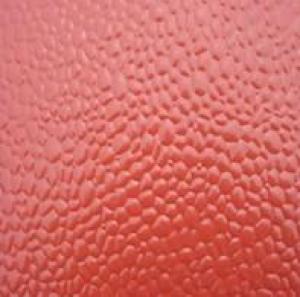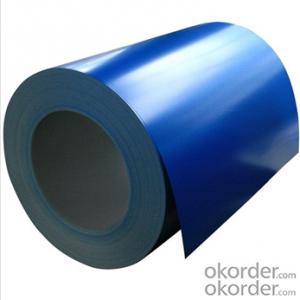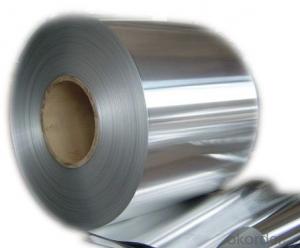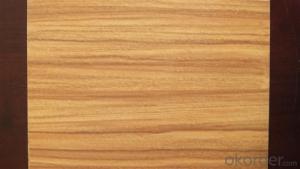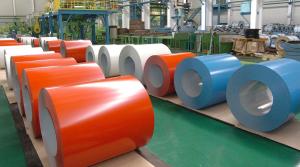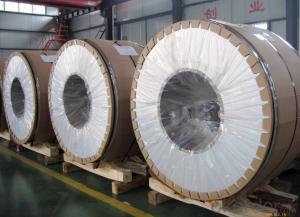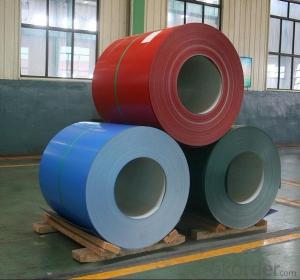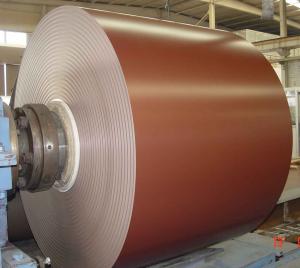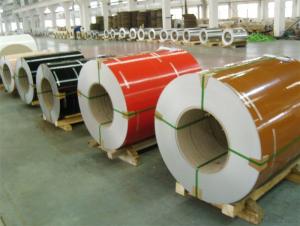PVDF Coated Aluminum Coil Painting - 5XXX
- Loading Port:
- China Main Port
- Payment Terms:
- TT OR LC
- Min Order Qty:
- -
- Supply Capability:
- -
OKorder Service Pledge
OKorder Financial Service
You Might Also Like
Product Description:
1 Specifications of PVDF Coated Aluminum Coil/Sheet
Alloy | AA1050,AA1060, AA1070, AA1100, AA3003, AA3004, AA3005, AA3105, AA5005, AA5052, AA5754, AA5083, AA8011 |
Temper: | H12, H14, H16, H18, H22, H24, H26, H32,HO, F |
Thickness: | 0.10-4.0mm |
Width: | 10mm- 2000mm |
Coating | PVDF |
Painting Thickness | Standard 16-25 microns, max 40 microns |
Color | Acording to Ral colors or customer’s samples |
Standard: | GB/T17748-1999, ASTM, ISO, EU standard |
Special Specification is available on customer’s requirement | |
PVDF(fluorine-carbon) Coating
PVDF(fluorine-carbon) coating :made of fluorine carbon resin, pigment, ester solvent, after high temperature roasting and baking, the paint is solidified to dry film with super weather resistance. PVDF coating also can be classified as traditional PVDF and nanometer PVDF coating.
A.Traditional PVDF Coating, with KYNAR500 PVDF, two or three times for coating and baking, has good properties of anti-acid, anti-alkali and is durable in atrocious weather and environment, keeping 15 years no unwonted fading. In view of these facts, we recommend this panel applied for external wall cladding.
B.Nanometer PVDF Coating, which different with traditional PVDF is the clear coating. It contains nanometer element, which can protect panel from pollution, Because nanometer has self-cleaning effect, It easy to get rid of dust and pollution by raining or water.
- Q: Are aluminum coils affected by magnetic fields?
- No, aluminum coils are not affected by magnetic fields as aluminum is not a magnetic material.
- Q: How are aluminum coils tested for dimensional accuracy?
- Various methods are used to test the dimensional accuracy of aluminum coils to ensure they meet the required specifications. One method commonly employed is the use of specialized equipment like calipers, micrometers, and digital measuring devices. These tools enable precise measurement of the coils' width, thickness, and length. During the testing process, a sample coil is chosen and measured at different points along its length to detect any variations or deviations from the specified dimensions. This helps identify any potential issues with the coil's dimensional accuracy. In addition to manual measurements, advanced technologies such as laser scanning systems and optical sensors are also utilized. These technologies allow for non-contact measurements, resulting in faster and more accurate assessments of the coil's dimensions. Laser scanners create a digital representation of the coil's surface, which can then be compared to the desired specifications to determine the presence of any deviations. Furthermore, computerized systems are employed to analyze the collected data and generate detailed reports. These reports provide comprehensive information about the coil's dimensional accuracy, highlighting any discrepancies from the required standards. This data analysis enables manufacturers to promptly identify and address any potential problems. In conclusion, stringent testing procedures are applied to aluminum coils to ensure their dimensional accuracy. The combination of manual measurements, advanced technologies, and computerized analysis provides a thorough assessment of the coils' dimensions. This enables manufacturers to maintain high-quality standards and deliver products that meet the precise specifications demanded by various industries.
- Q: Why 5052 turn black after annealing during the production of aluminum alloy?
- The aluminum oxide in the surface has been oxidized by other chemical elements.
- Q: Can aluminum coils be used in marine or saltwater environments?
- Indeed, marine or saltwater environments allow for the utilization of aluminum coils. The exceptional corrosion resistance of aluminum renders it a fitting material for a multitude of marine applications. The naturally occurring oxide layer on the exterior of aluminum acts as a shield against saltwater and other corrosive substances. This layer can be further fortified via procedures such as anodizing or painting, thereby augmenting its ability to resist corrosion. Furthermore, the lightweight nature of aluminum coils confers an advantage in marine applications where the reduction of weight is sought after. On the whole, the corrosion resistance and lightweight characteristics of aluminum coils render them a favored option in marine and saltwater environments.
- Q: Can a digital caliper be utilized to accurately measure the diameter of an aluminum coil?
- <p>Yes, you can use a digital caliper to measure the diameter of an aluminum coil accurately. Digital calipers are precise measuring tools, often accurate to 0.001 inches or 0.02mm, which is suitable for measuring the diameter of various objects, including aluminum coils. Ensure the caliper is zeroed before use and that the coil's surface is clean and flat where the measurement is taken to get accurate readings.</p>
- Q: Can aluminum coils be used in agricultural applications?
- Yes, aluminum coils can be used in agricultural applications. Aluminum is a versatile and durable material that can withstand various environmental conditions, making it suitable for agricultural equipment such as irrigation systems, greenhouse structures, and ventilation systems. Additionally, aluminum's light weight and corrosion-resistant properties make it an ideal choice for agricultural applications where durability and long-term performance are essential.
- Q: Can aluminum coils be used in power generation facilities?
- Yes, aluminum coils can be used in power generation facilities. Aluminum has excellent thermal conductivity, making it an efficient choice for heat transfer applications in power generation equipment such as heat exchangers and condensers. Additionally, aluminum's lightweight nature and corrosion resistance make it a viable option for various power generation processes, including wind turbines and hydroelectric power plants.
- Q: What is the maximum coil weight that can be produced?
- The maximum coil weight that can be produced depends on several factors such as the type of material being coiled, the size and capacity of the coiling equipment, and the strength and durability of the coil itself. In general, the maximum coil weight that can be produced can range from a few pounds to several tons. However, it is important to note that exceeding the recommended maximum coil weight can pose safety risks, cause damage to the equipment, and affect the quality and integrity of the coil. Therefore, it is essential to consult the manufacturer's guidelines and specifications to determine the maximum coil weight that can be safely and efficiently produced for a specific application.
- Q: Some makes like KIA make a point of having aluminum engines. I thought this was for weight, but was more prone to failure, especially in a high mileage car.
- Aluminum is touchy with heat, in comparison to steel. Generally the cylinder sleeves and berring surfaces are steel lined for durability. If you have a good radiator and thermostat, there is no reason the aluminum engine will not last 200,000 miles or more.
- Q: Can aluminum coils be used in extreme weather conditions?
- Yes, aluminum coils can be used in extreme weather conditions. Aluminum is a highly durable and corrosion-resistant material, making it suitable for various weather conditions including extreme heat, cold, humidity, and exposure to harsh elements.
Send your message to us
PVDF Coated Aluminum Coil Painting - 5XXX
- Loading Port:
- China Main Port
- Payment Terms:
- TT OR LC
- Min Order Qty:
- -
- Supply Capability:
- -
OKorder Service Pledge
OKorder Financial Service
Similar products
Hot products
Hot Searches
Related keywords
